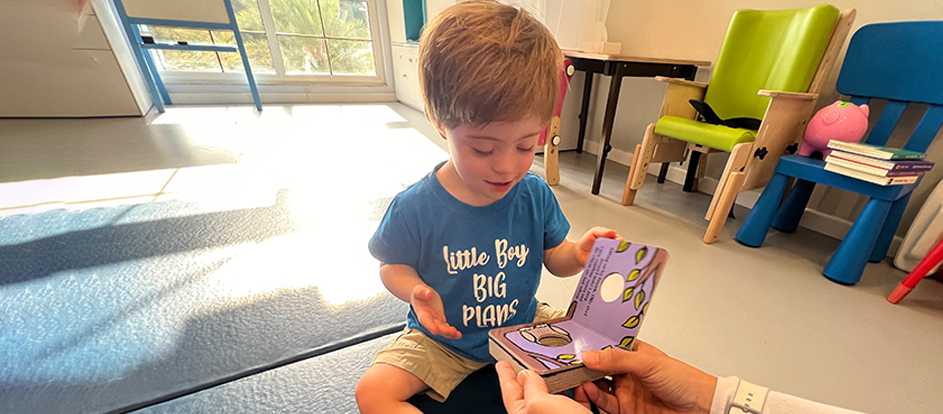

The Power of Books

Sally Al Murr
Senior Speech and Language Therapist
DHA License Number: 00167781-002

Have you ever wondered about the magic that happens when you read a book with your child? How does that special time together shape their language development? Join me on a journey as we explore the powerful impact of book reading on nurturing children’s language skills.
When is the right time to start reading with your child? Studies have shown that reading to babies, as young as eight months old, has a significant impact on early language development. Yet, if you haven’t started yet, it is never too late to start using this terrific language-learning tool!
How does reading with your child enhance their language skills? Here are some benefits of book reading:
- Vocabulary expansion: Children build their vocabulary when they hear new words many times, in different sentences and contexts, and when their meanings are made clear. All these opportunities are offered by a book when parents read it many times, use the same words in a variety of sentences throughout the book and point to pictures to give those words a meaning.
- Language comprehension: Books allow children to discover different themes and concepts. Your discussion around the pictures of the book or the story events enhances children’s understanding of language structure and meaning.
- Narrative skills: The exposure to different types of stories helps children understand narrative elements like plot, characters, and settings. Story books are a great tool to support children’s narrative skills as they retell the events of the story with details while relying on pictures and contextual cues.
- Cognitive skills: Reading books is a great tool to develop many cognitive concepts such as sequencing, problem solving, cause and effect and many more. When reading a book with your child, ask them about what happened first and what happened next to support sequencing skills. You may also ask about the reason behind an event to support cause and effect concept.
- Phonological awareness: Reading rhyming books or books with repetitive phrases helps develop children’s sensitivity to the sounds of language.
- Imagination: Books are a perfect tool to foster creativity and imaginative thinking in children. Encourage your child to anticipate or even imagine the end of the story.
- Early literacy skills: When reading for young children, point at words as you read them to introduce print awareness. Print awareness is a child’s earliest understanding that written language carries meaning.
- Emotions and feelings: Talking about the characters’ feelings builds your child’s perspective-taking skills and deepens their understanding of the characters’ behaviour and motivations. Encourage your child to observe the characters’ facial expressions, analyse their feelings and relate it to previous own experiences.
The advantages of book reading extend far beyond just that. Here are few tips to make book reading a more effective language-learning opportunity:
- Choose appropriate books: Selecting age-appropriate and engaging books is essential for keeping children interested. Head to the nearest library, let your child choose a book of his/her interest and help him/her pick the most suitable for his/her age. For young children, choose interactive and multi-sensory books such as noisy books, lift-the-flap books and tactile books with different textures.
- Encourage interaction: Encourage your child to ask questions, make predictions, and relate the story to own experiences. When parents respond to what the child is interested in, it helps the child learn new words.
- Use the OWL strategy: Observing, waiting and listening to your child’s messages is a powerful strategy because it gives you information about what your child is interested in, lets him/her start and lead the interaction as well as feel heard.
- You don’t have to read every word on the page. You can adapt the story so that your child can understand what is happening. You might have a great book with beautiful pictures and a wonderful story, but the text in the book is too difficult for your kids. It’s okay to change some words, skip some text, and adapt the story to suit the level of the children you are reading to. Use the illustrations to help you tell the story at a level that makes sense for your situation.
At High Hopes, Speech and Language Therapists frequently use story books during therapy sessions for their huge benefits on the child’s language and cognitive development. We also encourage parents to read for their children on a daily basis and use story time as an opportunity to apply and practice therapy strategies.
Sources:
- Dickinson, D. K., Griffith, J. A., Michnick Golinkoff, R., & Hirsh-Pasek, K. (2012). How Reading Books Fosters Language Development around the World. Child Development Research, vol. 2012. Available online at: http://www.hindawi.com/journals/cdr/2012/602807/cta/.
- Debaryshe, B. D. (1993). Joint picture-book reading correlates of early oral language skill. Journal of Child Language, 20(2), 455–461.
- Karrass, J. & Braungart-Rieker, J. M. (2005). Effects of shared parent-infant book reading on early language acquisition. Journal of Applied Developmental Psychology, 26(2), 133–148.
- National Early Literacy Panel (2008). Developing Early Literacy: Report of the National Early Literacy Panel. Washington, DC: National Institute for Literacy.
- “Shared Reading Quality and Developmental Outcomes for Children” by Adriana G. Bus et al. (2017)


